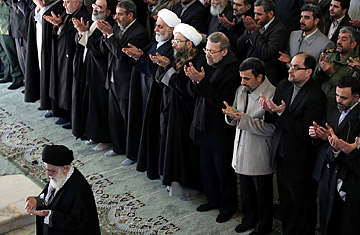
From friends to foes. Ahmadinejad's attempt to promote civilian, Islamist prerogatives at the expense of the clergy's authority ran afoul of Khamenei, the theocracy's Supreme Leader.
(3 of 4)
Ahmadinejad's allies are still taking hits. Last month, the President's top press adviser, Ali Akbar Javanfekr, was sentenced to one year in jail for insulting Khamenei in a Web posting. Javanfekr is appealing that sentence, but in mid-February he was sentenced to six months' jail time for a separate article he wrote that criticized a law making head coverings for women mandatory. State censors also blocked access to a number of websites supporting Ahmadinejad, some of which openly ridiculed Khamenei.
This cutthroat environment hasn't made it easy for Ahmadinejad loyalists to campaign for the parliamentary elections. In fact, the Guardian Council, the governmental body that vets candidates, has already disqualified a number of them. Many of the President's supporters are now disguising their allegiances and running as independents. "The Intelligence Ministry and other security bodies are highly sensitive about the 'deviant trend,' " says Mehdi Khalaji, a senior fellow at the Washington Institute for Near East Policy. "Ahmadinejad supporters can't enter the elections openly. They have to enter in a covert way."
His allies can be more open about their affiliation in the small towns and rural areas where the President's just-folks charm has preserved a good measure of his popularity. But Ahmadinejad has also tried to buttress his support through a more time-tested political tactic: cash handouts. In December 2010, Ahmadinejad's government began a broad program to slash subsidies for fuel, food and other basic goods. The government then circulated those savings as direct payments to ordinary Iranians, roughly $20 per person per month--not a huge sum for urbanites in Tehran but an amount that Iranians in impoverished rural areas were grateful for. "Some of the poorest sectors of Iranian society have become dependent on these subsidies, and they see themselves as being indebted to Ahmadinejad," says Fereydoun Khavand, an Iran specialist who teaches economics at the Ren Descartes University in Paris. "This would probably lead them to vote for Ahmadinejad in the election."
For his part, Khamenei can count on the loyalty of devout Iranians who regard him as the leader of the Islamic world. Among those diehard supporters are thousands of young men from the Basij, the paramilitary organization that acts as the Supreme Leader's muscle. These Basij militiamen played a large role in the crackdown against the protesters of the Green movement in 2009 and would likely be called into the streets again if there is any unrest during the upcoming elections. Animosity toward the U.S. is a fundamental pillar of the Islamic revolution in the eyes of this hardcore group. Khamenei realizes that any rapprochement with Washington on his part would diminish their support for him.
